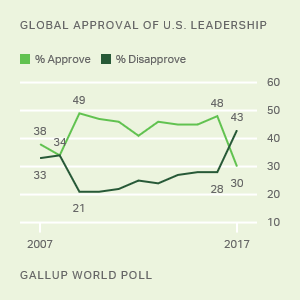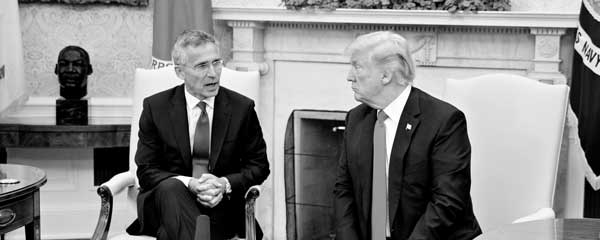Story Highlights
- Among U.S. allies, 57% say U.S. would defend them in military conflict
- Australians, Filipinos most confident in the U.S. defense commitment
- In 2017, New Zealand is the most shaken ally compared with 2016
WASHINGTON, D.C. -- While the Trump administration is still redefining the U.S. role in the Asia-Pacific, the region's reactions to the "America First" policy have been mixed so far. Despite a precipitous drop in approval of U.S. leadership among allied nations in the Asia-Pacific region, from 51% in 2016 to 38% in 2017, the belief among residents that the U.S. military would defend their country or territory in a military conflict remained largely steady.
| U.S. would defend country | Approval of U.S. leadership | ||||||||||||||||||||||||||||||||||||||||||||||||||||||||||||||||||||||||||||||||||||||||||||||||||
|---|---|---|---|---|---|---|---|---|---|---|---|---|---|---|---|---|---|---|---|---|---|---|---|---|---|---|---|---|---|---|---|---|---|---|---|---|---|---|---|---|---|---|---|---|---|---|---|---|---|---|---|---|---|---|---|---|---|---|---|---|---|---|---|---|---|---|---|---|---|---|---|---|---|---|---|---|---|---|---|---|---|---|---|---|---|---|---|---|---|---|---|---|---|---|---|---|---|---|---|
| 2016 | 2017 | Difference | 2016 | 2017 | Difference | ||||||||||||||||||||||||||||||||||||||||||||||||||||||||||||||||||||||||||||||||||||||||||||||
| % Yes | % Yes | pct. pts. | % Approve | % Approve | pct. pts. | ||||||||||||||||||||||||||||||||||||||||||||||||||||||||||||||||||||||||||||||||||||||||||||||
| Australia | 79 | 76 | -3 | 50 | 19 | - 31* | |||||||||||||||||||||||||||||||||||||||||||||||||||||||||||||||||||||||||||||||||||||||||||||
| Philippines | 78 | 76 | -2 | 71 | 59 | - 12* | |||||||||||||||||||||||||||||||||||||||||||||||||||||||||||||||||||||||||||||||||||||||||||||
| South Korea | 70 | 69 | -1 | 53 | 39 | - 14* | |||||||||||||||||||||||||||||||||||||||||||||||||||||||||||||||||||||||||||||||||||||||||||||
| New Zealand | 69 | 55 | - 14* | 51 | 15 | - 36* | |||||||||||||||||||||||||||||||||||||||||||||||||||||||||||||||||||||||||||||||||||||||||||||
| Japan | 53 | 50 | -3 | 47 | 31 | - 16* | |||||||||||||||||||||||||||||||||||||||||||||||||||||||||||||||||||||||||||||||||||||||||||||
| Thailand | 27 | 25 | -2 | 35 | 32 | -3 | |||||||||||||||||||||||||||||||||||||||||||||||||||||||||||||||||||||||||||||||||||||||||||||
| Total | 58 | 56 | -2 | 51 | 38 | - 13* | |||||||||||||||||||||||||||||||||||||||||||||||||||||||||||||||||||||||||||||||||||||||||||||
| * Denotes statistically significant difference | |||||||||||||||||||||||||||||||||||||||||||||||||||||||||||||||||||||||||||||||||||||||||||||||||||
| Gallup World Poll | |||||||||||||||||||||||||||||||||||||||||||||||||||||||||||||||||||||||||||||||||||||||||||||||||||
Importantly, the most recent round of data collection occurred in mid-2017 and does not reflect possible shifts in public opinion after more recent developments such as the suspension of a joint U.S.-South Korean military exercise following the Singapore summit between President Donald Trump and North Korean leader Kim Jong Un in June 2018.
Mixed Views on U.S. Defense Under Trump
The perceived willingness of the U.S. to defend allied and non-allied countries in a military conflict varies across the region. Australians and Filipinos were most likely to express confidence that the U.S. would come to their aid in 2016 and 2017, while Pakistanis and Chinese were least likely to do so.
Compared with 2016, fewer adults in Singapore, New Zealand, Indonesia and Taiwan believed the U.S. would defend their country [territory] in 2017. Adults in India and Pakistan grew more confident that the U.S. would defend their respective countries in 2017, but Pakistanis continued to express the most skepticism that any U.S. support would materialize.
Regardless of changes in perceptions of the U.S. defense commitment, residents in most countries, both allies and non-allies, reported lower approval ratings of U.S. leadership in 2017 than in 2016.
| U.S. would defend country | U.S. would not defend country | |||||||||||||||||||||||||||||||||||||||||||||||||||||||||||||||||||||||||||||||||||||||||||||||||||
|---|---|---|---|---|---|---|---|---|---|---|---|---|---|---|---|---|---|---|---|---|---|---|---|---|---|---|---|---|---|---|---|---|---|---|---|---|---|---|---|---|---|---|---|---|---|---|---|---|---|---|---|---|---|---|---|---|---|---|---|---|---|---|---|---|---|---|---|---|---|---|---|---|---|---|---|---|---|---|---|---|---|---|---|---|---|---|---|---|---|---|---|---|---|---|---|---|---|---|---|---|
| 2016 | 2017 | Difference | 2016 | 2017 | Difference | |||||||||||||||||||||||||||||||||||||||||||||||||||||||||||||||||||||||||||||||||||||||||||||||
| % | % | pct. pts. | % | % | pct. pts. | |||||||||||||||||||||||||||||||||||||||||||||||||||||||||||||||||||||||||||||||||||||||||||||||
| Ally | ||||||||||||||||||||||||||||||||||||||||||||||||||||||||||||||||||||||||||||||||||||||||||||||||||||
| Australia | 79 | 76 | -3 | 11 | 13 | +2 | ||||||||||||||||||||||||||||||||||||||||||||||||||||||||||||||||||||||||||||||||||||||||||||||
| Philippines | 78 | 76 | -2 | 14 | 18 | +4 | ||||||||||||||||||||||||||||||||||||||||||||||||||||||||||||||||||||||||||||||||||||||||||||||
| South Korea | 70 | 69 | -1 | 18 | 24 | +6* | ||||||||||||||||||||||||||||||||||||||||||||||||||||||||||||||||||||||||||||||||||||||||||||||
| New Zealand | 69 | 55 | -14* | 17 | 28 | +11* | ||||||||||||||||||||||||||||||||||||||||||||||||||||||||||||||||||||||||||||||||||||||||||||||
| Japan | 53 | 50 | -3 | 33 | 34 | +1 | ||||||||||||||||||||||||||||||||||||||||||||||||||||||||||||||||||||||||||||||||||||||||||||||
| Thailand | 27 | 25 | -2 | 27 | 26 | -1 | ||||||||||||||||||||||||||||||||||||||||||||||||||||||||||||||||||||||||||||||||||||||||||||||
| Not ally | ||||||||||||||||||||||||||||||||||||||||||||||||||||||||||||||||||||||||||||||||||||||||||||||||||||
| India | 37 | 46 | +9* | 33 | 21 | -12* | ||||||||||||||||||||||||||||||||||||||||||||||||||||||||||||||||||||||||||||||||||||||||||||||
| Singapore | 57 | 41 | - 16* | 7 | 31 | +24* | ||||||||||||||||||||||||||||||||||||||||||||||||||||||||||||||||||||||||||||||||||||||||||||||
| Taiwan | 44 | 37 | - 7* | 35 | 44 | +9* | ||||||||||||||||||||||||||||||||||||||||||||||||||||||||||||||||||||||||||||||||||||||||||||||
| Indonesia | 42 | 33 | - 9* | 35 | 38 | +3 | ||||||||||||||||||||||||||||||||||||||||||||||||||||||||||||||||||||||||||||||||||||||||||||||
| Myanmar | 35 | 32 | -3 | 27 | 22 | - 5* | ||||||||||||||||||||||||||||||||||||||||||||||||||||||||||||||||||||||||||||||||||||||||||||||
| Mongolia | 30 | 30 | 0 | 37 | 47 | +10* | ||||||||||||||||||||||||||||||||||||||||||||||||||||||||||||||||||||||||||||||||||||||||||||||
| Hong Kong | 13 | 16 | +3 | 82 | 81 | -1 | ||||||||||||||||||||||||||||||||||||||||||||||||||||||||||||||||||||||||||||||||||||||||||||||
| China | 13 | 13 | 0 | 51 | 57 | +6* | ||||||||||||||||||||||||||||||||||||||||||||||||||||||||||||||||||||||||||||||||||||||||||||||
| Pakistan | 6 | 11 | +5* | 82 | 80 | -2 | ||||||||||||||||||||||||||||||||||||||||||||||||||||||||||||||||||||||||||||||||||||||||||||||
| * Denotes a statistically significant difference | ||||||||||||||||||||||||||||||||||||||||||||||||||||||||||||||||||||||||||||||||||||||||||||||||||||
| GALLUP World Poll | ||||||||||||||||||||||||||||||||||||||||||||||||||||||||||||||||||||||||||||||||||||||||||||||||||||
Shifts in residents' likelihood to believe the U.S. would not defend the country [territory] also provide important information. In 2017, more respondents in Singapore, New Zealand, Mongolia, Taiwan, China and South Korea said the U.S. would not defend their country [territory] during a military conflict. The perception that the U.S. would be unwilling to provide defense diminished in India and Myanmar.
India is a regional outlier. Despite a slight decline (four percentage points) in approval of U.S. leadership under Trump, Indians are considerably more confident in U.S. defensive support for their country in a military conflict compared with 2016. This could be related to the United States' designating India as a "major defense partner" in 2016, which allowed it to start receiving U.S. defense technology in 2017.
New Zealand and South Korea are the two allies whose confidence in U.S. support decreased the most in 2017 relative to 2016. The 2017 South Korean data were collected as North Korea was ratcheting up its missile testing program, launching several missiles during the March to July survey period. The U.S. response to these missile tests may have made South Koreans less confident in U.S. support. It may be somewhat surprising that a quarter of South Koreans do not think the U.S. would defend their country, considering the U.S. has 28,000 military personnel stationed there.
Implications
The pivot to Asia, a strategic initiative undertaken during the Obama administration, was an effort to increase the U.S. profile in the Asia-Pacific region. The ultimate goal was to balance Chinese influence by demonstrating a long-term commitment through increased multilateral trade via the Trans-Pacific Partnership (TPP) and strengthened bilateral security arrangements.
In contrast, the Trump administration has taken some bold moves that have shaken up the status quo in the region. The sudden withdrawal from the TPP days after Trump took office and subsequent tough trade negotiations with Japan and South Korea signaled the transactional underpinnings of an America First foreign policy.
More recently, the emerging trade war between the U.S. and China has rattled markets. Meanwhile, efforts to denuclearize the Korean peninsula have led to the unanticipated suspension of joint military exercises with South Korea and talk about possible future withdrawal of U.S. forces from the peninsula. The increased uncertainty that accompanies these dramatic shifts raises questions about how much countries, especially allies, fundamentally trust the U.S. and its commitment to the region.
Survey Methods
These results are based on World Poll interviews conducted from April 2016 to July 2016, and from February 2017 to September 2017. They consist of nationally representative samples of 1,000 to 3,000 adults, aged 15 and older, per country. For results based on these national samples of adults, the margins of sampling error are ±4.5 percentage points or less at the 95% confidence level.
For complete methodology and specific survey dates, please review Gallup's Country Data Set details.
Learn more about how the Gallup World Poll works.



